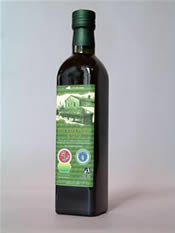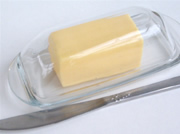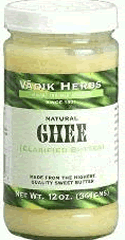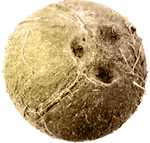Introduction to Fats and Oils
Summary: Eat fresh raw oils as
found in raw nuts, many vegetables, and some fruits. Avoid hydrogenated
oils (in processed foods and margarine) and trans fats (fried foods and highly
processed oils).Use extra virgin olive oil, butter, Smart Balance,
or Spectrum's spread. When high heat cooking like frying must be done, use saturated
non-hydrogenated oils, like non-hydrogenated lard, ghee, or coconut oil, or if they are not available,
Smart Balance cooking oil. Eat fish rich in omega 3 oils once per week.
 Essential fatty acids (EFAs) are ones that must be consumed
since the body cannot synthesize them. These include omega 6 and
omega 3 oils. Omega 6's are common in the diet. Omega 3's are harder
to come by unless a special effort is made. Some of the few sources are
flax oil, walnuts, and some coldwater fish. See the EFA
supplement section for information on some commercially available
supplements. Essential fatty acids (EFAs) are ones that must be consumed
since the body cannot synthesize them. These include omega 6 and
omega 3 oils. Omega 6's are common in the diet. Omega 3's are harder
to come by unless a special effort is made. Some of the few sources are
flax oil, walnuts, and some coldwater fish. See the EFA
supplement section for information on some commercially available
supplements.
Although olive oil is not a good source of EFAs, it is still a healthy oil to consume. The extra virgin type is best, but there is some debate asto whether it should be used for cooking at all but the lowest heat levels. Processed, light olive oils are okay for low heat cooking. Good extra virgin olive oils are packaged in dark, airtight containers to prevent light from damaging them.
To be best used by the body, EFA oils should not be damaged by
being excessively heated. This causes trans fats to be formed.
Hydrogenation is a process to make fats stable, which is why it is used in many
processed foods - the fats don't go rancid as quickly. This also damages
the oils where they cannot be effectively used by the body. For a complete
explanation of this see any competent book on fats and oils like Uda Erasmus' Fats
That Heal, Fats That Kill.
Diet is an important aspect of how EFAs are used in the
body. Eat too many carbs and not enough protein and the body tends to
produce more inflammatory and blood clotting hormones with the EFAs it
gets. If adequate protein is eaten, the fats are used more efficiently,
energy levels are boosted, weight regulation is stimulated, and more
anti-inflammatory hormones are produced. For more information and a
technical discussion on how EFAs are used in the body, seeEssential
Fatty Acid Metabolism.
 Fat and cholesterol are used in the construction of most body
cells along with many other nutrients. If there are insufficient EFAs (or
other nutrients, especially antioxidants) the cells and hence their structures are weak. A major factor is the presence of trans fatty acids (in fried foods and margarine) and hydrogenated oils (in margarine and
many processed foods), which are much worse than saturated fats. Saturated
fats are
mostly undamaged by the heat of cooking plus their short chain acids can be used
by the body effectively. Unnatural fats and their structures are not typical of EFAs. If this is all that is available, the body will attempt to use them as it does any fat in constructing ground substance. However, the resulting structure will be weak, especially if there is a lack of antioxidants. Fat and cholesterol are used in the construction of most body
cells along with many other nutrients. If there are insufficient EFAs (or
other nutrients, especially antioxidants) the cells and hence their structures are weak. A major factor is the presence of trans fatty acids (in fried foods and margarine) and hydrogenated oils (in margarine and
many processed foods), which are much worse than saturated fats. Saturated
fats are
mostly undamaged by the heat of cooking plus their short chain acids can be used
by the body effectively. Unnatural fats and their structures are not typical of EFAs. If this is all that is available, the body will attempt to use them as it does any fat in constructing ground substance. However, the resulting structure will be weak, especially if there is a lack of antioxidants.
When any tissue in the body is weak, it will typically compensate by making more of it. In blood vessels, cholesterol or other fatty deposits are typically used to add thickness to the vessel walls. This is going for short-term
damage control of preventing the vessels from bursting from being too weak to contain the pressure, at the expense of the long-term detriment of clogging the  vessels with these deposits and making the heart work harder. Clogged vessels are therefore mostly a symptom of nutrient defiency
of too little good oils (and antioxidants) or too many bad oils. Destroying the liver
with toxic drugs to inhibit its proper function of providing fat and
cholesterol to repair the weak vessels is silly. vessels with these deposits and making the heart work harder. Clogged vessels are therefore mostly a symptom of nutrient defiency
of too little good oils (and antioxidants) or too many bad oils. Destroying the liver
with toxic drugs to inhibit its proper function of providing fat and
cholesterol to repair the weak vessels is silly.
For high heat cooking, it is best to use saturated oils like
coconut, ghee (Ghee recipe), or even the
 saturated fat most recommended by Hulda Clark, lard (but I have not seen any
that wasn't at least partially hydrogenated.) Peanut oil can handle high heat better than
other non-saturated vegetable oils, but should not be consumed on a regular
basis for other reasons (see Toxin
Avoidance section Food article.) saturated fat most recommended by Hulda Clark, lard (but I have not seen any
that wasn't at least partially hydrogenated.) Peanut oil can handle high heat better than
other non-saturated vegetable oils, but should not be consumed on a regular
basis for other reasons (see Toxin
Avoidance section Food article.)
Excellent cooking and nutritional oils which are processed with
low heat and oxygen and sold in opaque bottles to prevent damage are available
from Omega Nutrition. Many
health food stores carry Omega's products. Their patented omegaflo
process is also used by a number of manufacturers. They make some
coconut oil products for cooking, too, which are usually sold in good health food stores.
Good coconut oil, such as the extra virgin type, is an unprocessed oil that has been shown to help maintain cholesterol, support proper thyroid levels and assist digestion.
Coconut Oil contains lauric acid (found in mother's milk), which provides nutrients to the immune system and may help fight chronic viruses. It also contains medium-chain fatty acids. That are metabolized and converted to energy, rather than being stored as fat in your body.
David Lawrence Dewey had this to
say about coconut oil on his website at http://www.dldewey.com:
Coconut oil has been looked at negatively because of its fat content. However,
it actually helps the body to metabolize fatty acids better than any other oil.
You can actually loose weight using coconut oil and it is great for frying
chicken. It is one of the few oils that does not become rancid quickly if it is
tightly sealed. Over 40 years ago, researchers said they found that feeding
coconut oil to animals caused their cholesterol to rise. There was only one main
problem, the oil was hydrogenated. We all now know that hydrogenated oils
raise cholesterol and triglycerides. If you look at the people in the Pacific
Islands like Hawaii, ones that have only used natural, un-hydrogenated,  cold expeller pressed coconut oil, you will find one of the lowest cholesterol levels
and lowest incidence of heart disease in the world. And it keeps the skin smooth
and young looking. In recent studies, coconut oil acts as an antihistamine,
anti-diabetic, anti-infective and even an anti-cancer agent. Why? It
contains high levels of lauric acid, a powerful anti-viral substance the only
other good source of which is human breast milk (butter has some as well). Pure, cold expeller pressed coconut
oil is hard to find. It is hard, you can refrigerate it for months as long as
the lid is on tight. Use it in salad dressing, and recipes combined with olive oil. cold expeller pressed coconut oil, you will find one of the lowest cholesterol levels
and lowest incidence of heart disease in the world. And it keeps the skin smooth
and young looking. In recent studies, coconut oil acts as an antihistamine,
anti-diabetic, anti-infective and even an anti-cancer agent. Why? It
contains high levels of lauric acid, a powerful anti-viral substance the only
other good source of which is human breast milk (butter has some as well). Pure, cold expeller pressed coconut
oil is hard to find. It is hard, you can refrigerate it for months as long as
the lid is on tight. Use it in salad dressing, and recipes combined with olive oil.
Ghee Recipe
Another version of this recipes is available in the Recipes and Formulas section
From The Ayurvedic Institute
1 pound unsalted butter
Put the butter in a heavy, medium-sized pan. Turn the heat on to medium until the butter melts.
Turn down the heat until the butter just boils and continue to cook at this heat. Do not cover the pot. The butter will foam and sputter while it cooks. Whitish curds will begin to form on the bottom of the pot. The butter will begin to smell like popcorn after a while and turn a lovely golden color. Keep a close watch on the ghee, as it can easily burn. After a while it will become a clear, golden color. You will have to take a clean, dry spoon to move away some of the foam on top in order to see if the ghee is clear all the way through to the bottom. When it is clear and has stopped sputtering and making noise, then it needs to be taken off the heat. Let it cool until just warm. Pour it through a fine sieve or layers of cheesecloth into a clean, dry glass container with a tight lid. Discard the curds at the bottom of the saucepan. The ghee is burned if it has a nutty smell and is slightly brown.
1 pound of butter takes about 15 minutes of cooking time. The more butter you are using, the more time it will take.
Ghee can be kept on the kitchen shelf, covered. It does not need refrigeration. The medicinal properties are said to improve with age. Don’t ladle out the ghee with a wet spoon or allow any water to get into the container, as this will create conditions for bacteria to grow and spoil the ghee.
Two pounds of butter will fill a quart jar with ghee. |
|